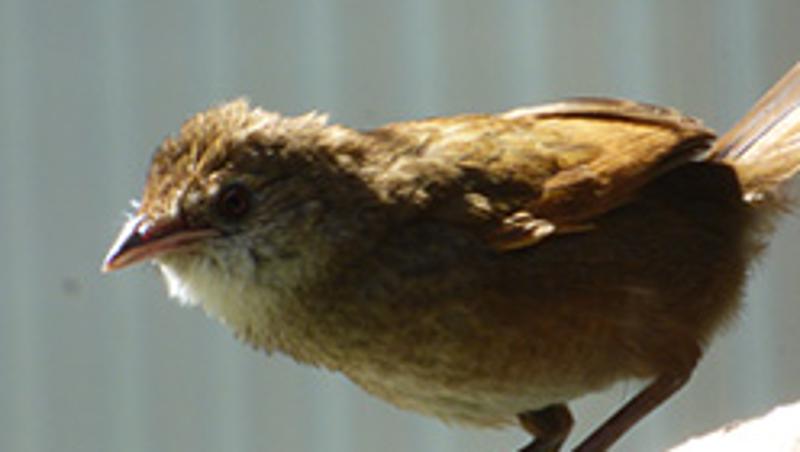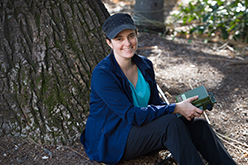
The power of people is the key to helping find Australia’s endangered eastern bristlebird, according to QUT researcher Jessie Cappadonna who is using acoustics to locate the birds by their calls.
As part of her PhD, Ms Cappadonna is working with members of the Eastern Bristlebird Recovery Team, to come up with new ways to engage citizen scientists with acoustic recordings, which are a critical tool for improving the chances of survival for the eastern bristlebird.
As part of her plan to engage the wider public with the search, Ms Cappadonna has been selected to take part in the southern hemisphere’s first Soapbox Science event, which is a novel public outreach platform promoting women scientists and the science they do.
 “Soapbox Science is about bringing science to the people and showing the public that many women lead innovative and diverse scientific research. I will be getting on my soapbox and telling people about my research and even about how they can be involved,” Ms Cappadonna said.
“Soapbox Science is about bringing science to the people and showing the public that many women lead innovative and diverse scientific research. I will be getting on my soapbox and telling people about my research and even about how they can be involved,” Ms Cappadonna said.
With a background in ecology and public engagement, Ms Cappadonna sees citizen science as a way for the public to be directly involved in the scientific research process.
“With recent advances in technology, citizen science allows bigger questions to be asked than everyone could have ever dreamed possible and it has led to substantial scientific breakthroughs,” she said
“My project is specifically looking at how we can engage citizen scientists with an interest in acoustics to help locate the eastern bristlebird in acoustic recordings from habitats where we are hopeful the birds still reside.
“Eastern bristlebirds are a secretive, cryptic, ground-dwelling species that often won’t call when people are surveying the habitats but acoustics can record with minimal disturbance, over long periods of time, so with a bit of luck the birds will come out and sing to each other once people have left the area.
“Sounds of nature are very complex, variable, and often overlapping. Birds in particular often have a substantial amount of variation in their calls, which means automated recognition software only has limited effectiveness for many species.
“Eastern bristlebirds have loads of variation in their call and citizen scientists are likely to be much better than computers at distinguishing the calls of a bristlebird from those of other species.
“We already have more than 2600 hours of recordings and are hopeful to get more soon but the challenge is how do we review all this data in a timely way?
“Citizen scientists interested in acoustics and bird conservation can make light work of the acoustic search and are critical to address this conservation challenge.”
Ms Cappadonna is working closely with members of the Eastern Bristlebird Recovery Team from BirdLife Southern Queensland, Healthy Waterways and Catchments, the NSW Office Department of Environment and Heritage, Queensland Department of Environment and Heritage Protection, University of Queensland, and Currumbin Wildlife Sanctuary.
She said the outcomes of her research have the potential to not only be a win for the eastern bristlebirds but also a win for understanding how to engage with citizen scientists with acoustics more broadly.
Ms Cappadonna will present her research at Soapbox Science Brisbane being held on August 20 from 1-4pm in King George Square, Brisbane.
Joining Ms Cappadonna will be QUT Professor Chamindie Punyadeera talking about how cancer and heart disease detection is spitting distance away.
For more information or to view a list of the other speakers, visit http://soapboxscience.org/
This event is part of a UK-wide initiative by Soapbox Science, which aims to bring science to the people and challenge gender stereotypes in science careers. Soapbox Science events are part funded by the Science and Technology Facilities Council (STFC), and the Natural and Environmental Research Council (NERC).
Soapbox Science Brisbane 2016 is supported by the Queensland Government’s Advance Queensland initiative, the ARC Centre of Excellence for Environmental Decisions, and UQ’s Global Change Institute, Brisbane City Council, Queensland University of Technology, the Modelling and Simulation Society of Australia and New Zealand, the ARC Centre for Cognition and its Disorders, the Australian Society for Microbiology and Griffith University Institute for Glycomics.
Media contacts:
Sandra Hutchinson, QUT Media, 07 3138 9449 (Tue/Wed) or media@qut.edu.au
After hours: Rose Trapnell, 0407 585 901




